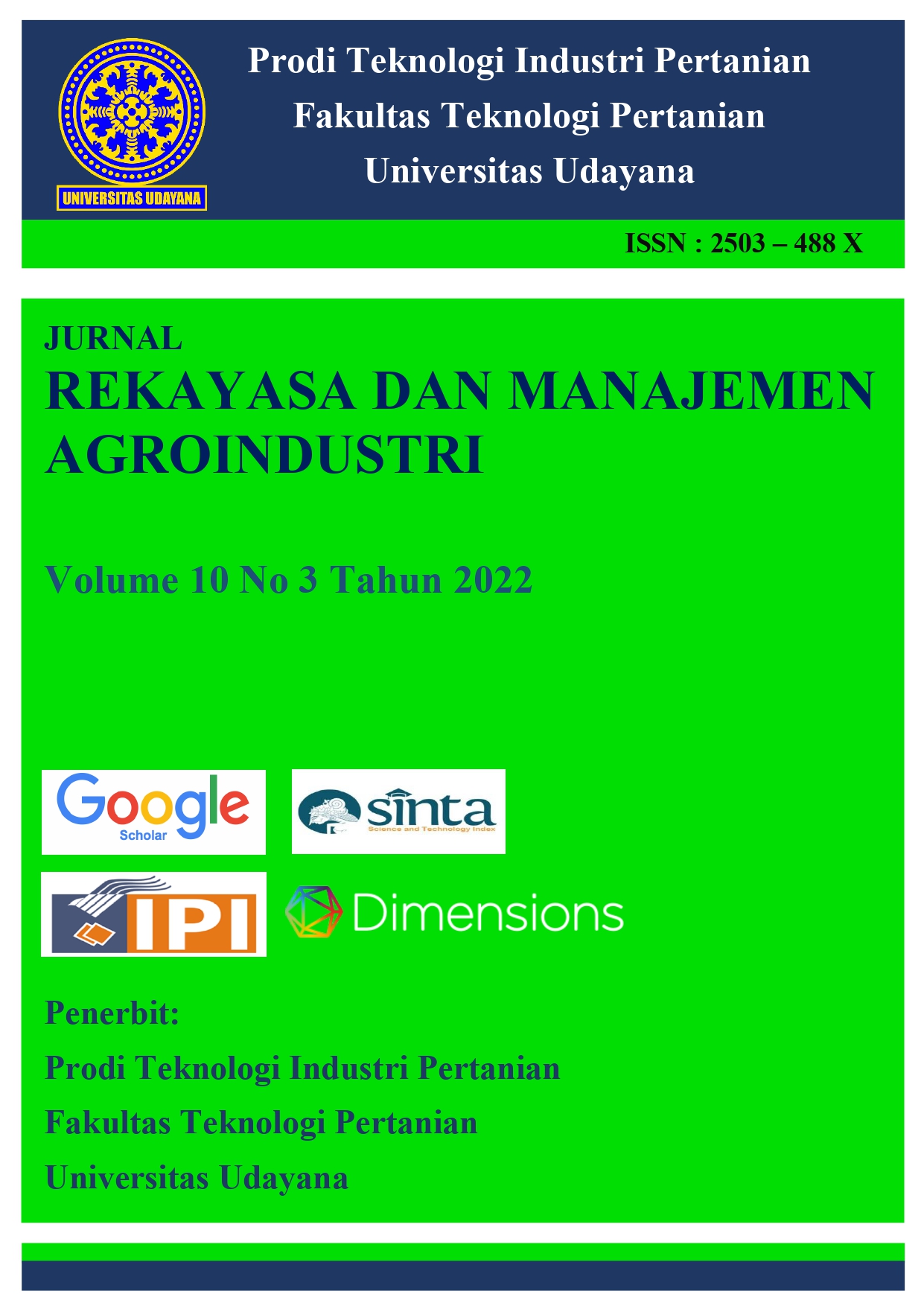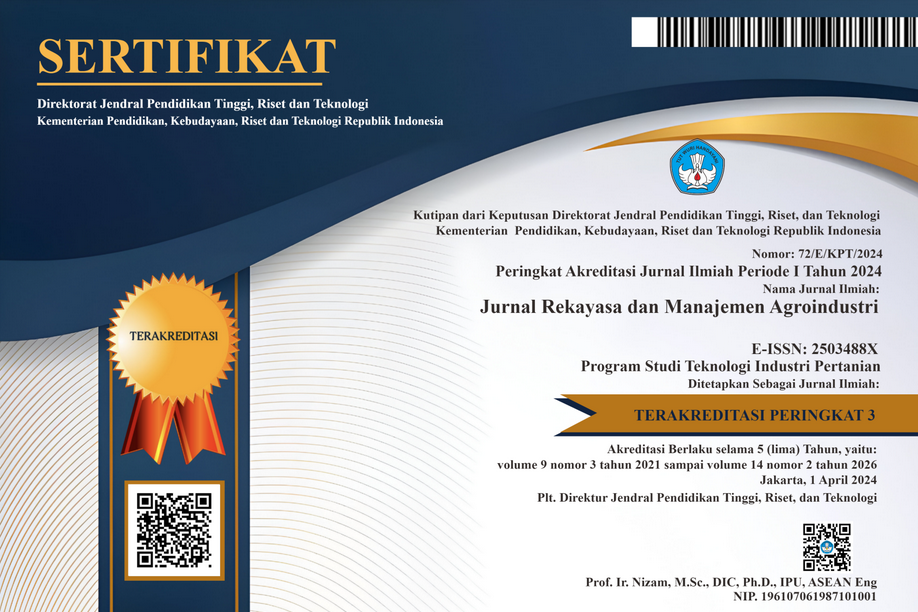PENGARUH RASIO GULA AREN DAN KULIT BUAH NANAS TERHADAP KARAKTERISTIK EKO-ENZIM KULIT BUAH NANAS (Ananas comosus)
Abstract
Ecoenzyme is a product of fermentation process that can be used as disinfectant, biocompose, and surface cleaner. In general, ecoenzyme production use organic waste, glucose, and water which fermented for 3 months in anaerob environment before harvested. This research intend to determine the effect of brown sugar addition on characteristics of ecoenzyme from pineapple peels. This research using completely randomized design with single factor. The factor in this research is addition of brown sugar in different ratio. Brown sugar addition of pineapple peels consist of 6 level which are 0:6 ratio; 1:6 ratio; 2:6 ratio; 3:6 ratio; 4:6 ratio; and 5:6 ratio of brown sugar. Variables observed in this research are alcohol contain, pH, and total dissolve solid. The result of this observation indicate that brown sugar addition affected alcohol contain, acidity, and total dissolve solid of ecoenzyme from pineapple peels. Ecoenzyme has higest alcohol contain on day 8 and decresed on day 10. Addition of 5:6 brown sugar ratio was the best treatment with 8,25±0,22% (v/v) alcohol contain, 3,98± 0,11 pH, and 7,87± 1,03 total dissolve solid value.
Downloads
References
[2] S. S. Kerkar dan S. S. Salvi, “Application of eco-enzyme for domestic waste water treatment,” International Journal for Research in Engineering Application & Management, vol. 5, no. 11, Feb., pp. 114-116, 2020.
[3] N. U. Rohmah, A. P. Astuti, dan E. T. W. Maharani, “Organoleptic test of the ecoenzyme pineapple honey with variations in water content,” dalam Seminar Nasional Edusainstek, 2020, pp. 408-414.
[4] M. R. Rahayu, I N. Muliarta, dan Y. P. Situmeang, “Acceleration of production natural disinfectants from the combination of eco-enzyme domestic organic waste and frangipani flowers (Plumeria alba),” Sustainable Environment Agricultural Science, vol. 5, no. 1, April., pp. 15-21, 2021.
[5] H. Heryani, Keutamaan gula aren & strategi pengembangan produk, Banjarmasin: Lambung Mangkurat University Press, 2016.
[6] F. E. Tang dan C. W. Tong, “A study of garbage enzyme’s effects in domestic wastewater,” World Academy of Science, vol. 60, pp. 1143-1148, 2011.
[7] Supriyani, A. P. Astuti, dan E. T. W. Maharani, “Pengaruh variasi gula terhadap produksi ekoenzim menggunakan limbah buah dan sayur,” dalam Seminar Nasional Edusaintek, 2020, pp. 470-479.
[8] C. Arun dan P. Sivashunmugam, “Investigation of biocatalytic potential of garbage enzyme and its influence on stabilization of industrial waste activated sludge,” Process Safety and Environmental Protection, vol. 94, Mar., pp. 471-478, 2020.
[9] Badan Pusat Statistik, “Produksi tanaman buah-buahan,” Badan Pusat Statistik, 2021. [Online]. Available: https://www.bps.go.id/indicator/55/62/1/produksi-tanaman-buah-buahan.html. [Accessed: Des. 27, 2021].
[10] P.P. Utomo, “Pemanfaatan nanas (Ananas comosus) sebagai bahan baku pembuatan bioetanol dengan metode sakarifikasi dan fermentasi serentak,” Biopropal Industri, vol. 2, no. 1, Jun., pp. 1-6, 2011.
[11] A. S. Sandika, S. R. Muria, dan S. R. Yenti, “Fermentasi kulit nanas menjadi bioetanol menggunakan Zymomonas mobilis dengan variasi pemekatan medium dan waktu fermentasi,” JOM FTEKNIK, vol. 4, no. 1, Feb., pp. 1-5, 2017.
[12] A. Syauqi dan S. S. Inasari, “Pemanfaatan limbah kulit nanas (Ananas comosus L.) menjadi bioetanol dengan penambahan ragi (Saccharomyces cerevisiae) yang berbeda,” Buletin LOUPE, vol. 16, no. 2, Des., pp. 67-73, 2020.
[13] N. Rasit, L. H. Fern, dan W. A. W. A. K. Ghani, “Production and characterization of eco enzyme produced from tomato and orange waste and its influence on the aquaculture sludge,” International Journal of Civil Engineering and Technology, vol. 10, no. 2, Mar., pp. 967-980, 2020.
[14] N. Azizah, A. N. Al-Baarri, dan S. Mulyani, “Pengaruh lama fermentasi terhadap kadar alkohol, pH, dan produksi gas pada proses fermentasi bioetanol dari whey dengan substitusi kulit nenas,” Jurnal Aplikasi Teknologi Pangan, vol. 1, no. 2, pp. 72-77, 2012.
[15] U. Fadilah, I M. M. Wijaya, dan N. S. Antara, “Studi pengaruh pH awal media dan lama fermentasi pada proses produksi etanol dari hidrolisat tepung biji nangka dengan menggunakan Saccharomyces cerevisiae,” Jurnal Rekayasa dan Manajemen Agroindustri, vol. 6, no. 2, Apr., pp. 92-102, 2018.
[16] S. A. Putri, F. Restuhadi, dan Rahmayuni, “Hubungan antara kadar gula reduksi, jumlah sel mikrob dan etanol dalam produksi bioetanol dari fermentasi air kelapa dengan penambahan urea,” JOM FAPERTA, vol. 3, no. 2, Okt., pp. 1-8, 2016.
[17] N. W. P. Wulandari, D. G. M. Permana, dan A. S. Duniaji, “Pengaruh jenis ragi pada fermentasi kakao terhadap karakteristik cuka kakao,” Jurnal Ilmu dan Teknologi Pangan, vol. 8, no. 3, Sep., pp. 323-329, 2019.
[18] M. K. Bayu, H. Rizqiati, dan Nurwanto, “Analisis total padatan terlarut, keasaman, kadar lemak, dan tingkat viskositas pada kefir optima dengan lama fermentasi yang berbeda,” Jurnal Teknologi Pangan, vol. 1, no. 2, Nov., pp. 33-38, 2017.
[19] N. Ismawati, Nurwantoro, dan Y. B. Pramono, “Nilai pH, total padatan terlarut, dan sifat sensoris yoghurt dengan penamba-han ekstrak bit (Beta vulgaris L.),” Jurnal Aplikasi Teknologi Pangan, vol. 5, no. 3, Jul., pp. 89-93, 2016.
[20] R. A. Sintasari, J. Kusnadi, dan D. W. Ningtyas, “Pengaruh penambahan konsentrasi susu skim dan sukrosa terhadap karakteristik minuman probiotik sari beras merah,” Jurnal Pangan dan Agroindustri, vol. 2, no. 3, Jul., pp. 65-75, 2014.

Ciptaan disebarluaskan di bawah Lisensi Creative Commons Atribusi-BerbagiSerupa 4.0 Internasional.
Seluruh artikel di Jurnal ini dapat disebarluaskan atas tetap mencantumkan sumber yang syah. Identitas judul artikel tidak boleh dihilangkan. Penerbit tidak bertangggung jawab terhadap naskah yang dipublikasikan. Isi artikel menjadi tanggung jawab Penulis.














